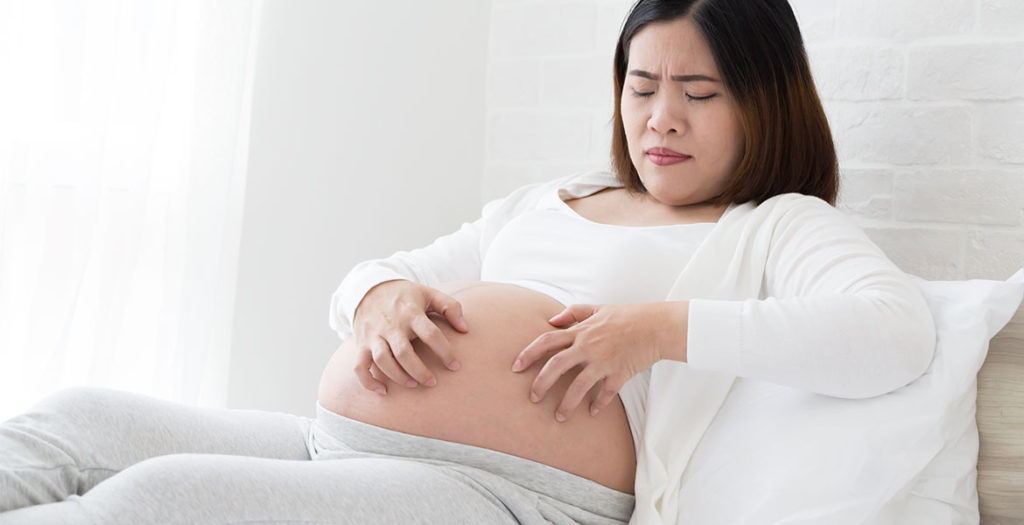We talk to Dr Shazia Malik, Consultant Obstetrician and Gynaecologist at The Portland Hospital about chickenpox in pregnancy
 Most women (at least 8 out of 10) are immune to chicken pox, having had it in childhood. If you come into contact with chickenpox when you are pregnant and you have already had chickenpox, you will be immune and there is nothing to worry about.
Most women (at least 8 out of 10) are immune to chicken pox, having had it in childhood. If you come into contact with chickenpox when you are pregnant and you have already had chickenpox, you will be immune and there is nothing to worry about.
However, if you have never had chickenpox, or are not sure, see your GP as soon as possible. You can have a blood test to find out if you are immune. Eight out of 10 women in this situation will be immune without realising it. If you develop a rash in pregnancy, you should contact your GP or midwife.
If you are not immune to chickenpox and you come into contact with it during pregnancy, you may be given an injection of varicella zoster immune globulin (VZIG). This is a human blood product that strengthens the immune system, although it may not prevent chickenpox developing. It is safe to have in pregnancy. VZIG can make the infection milder and not last for as long. The injection can be given within the first 10 days after you come into contact with chickenpox as long as you don’t yet have any symptoms. VZIG does not work once you have blisters.
Chickenpox can be serious for your health during pregnancy. Complications can occur such as chest infection (pneumonia), inflammation of the liver (hepatitis) and inflammation of the brain (encephalitis). Very rarely, women can die from complications. You are at greater risk of complications if you catch chickenpox when you are pregnant if you:
- Smoke cigarettes
- Have a lung disease such as bronchitis or emphysema
- Are taking steroids or have done so in the last three months
- Are more than 20 weeks pregnant.
If any of these apply to you, you may need to be referred to hospital
What could chickenpox mean for my baby during pregnancy and after birth?
The risk of your baby catching chickenpox depends on when in your pregnancy you catch it. The highest risk is during the last four weeks of pregnancy. If you catch chickenpox:
- Before 28 weeks of pregnancy there is no evidence that you are at an increased risk of early miscarriage. Your baby is unlikely to be affected; however there is a small chance that damage could occur to the eyes, legs, arms, brain, bladder or bowel. This only happens in fewer than one in 100 babies. You will be referred to a fetal medicine specialist for ultrasound scans and discussion about possible tests and their risks.
- Between 28 and 36 weeks of pregnancy the virus will stay in your baby’s body but will not cause any symptoms. The virus may become active again, causing shingles in the first few years of his or her life.
- After 36 weeks of pregnancy; this is the time when your baby is at greatest risk of getting chickenpox. If your baby is born within seven days of your chickenpox rash appearing or you get chickenpox within the first week after birth, your baby may get severe chickenpox. He or she will be given VZIG and treated with an antiviral drug called Aciclovir and monitored closely after birth.
It is safe to breastfeed if you have had chickenpox during pregnancy or after the birth of your baby. If you have blisters close to the nipple, you should express milk from that side (and throw it away) until they crust over. If you catch chickenpox in pregnancy or when you are trying to become pregnant, you should avoid contact with other pregnant mothers and new babies until all your blisters have crusted over.
Can I be treated if I develop chickenpox during pregnancy?
If you are more than 20 weeks pregnant, you can be given Aciclovir to reduce fever and symptoms. This should be given within 24 hours of the chickenpox rash appearing.
Aciclovir is not licensed in pregnancy but does not appear to be harmful for unborn babies and therefore may also be considered before 20 weeks. You will able to discuss the benefits and risks with your doctors.
When should I be referred to hospital if I have chickenpox?
Your GP should send you to hospital if you have chickenpox and develop any of the following:
- Chest and breathing problems
- Headache, drowsiness, vomiting or feeling sick
- Vaginal bleeding
- A rash that is bleeding
- A severe rash.
These symptoms may be a sign that you are developing the complications of chickenpox. If this is the case, aciclovir may be given to you through a drip in your arm. You should also be admitted to hospital if you have a condition that means your immune system does not work as well as it should (known as being immune suppressed). If you need to be admitted to hospital, you will be nursed in a side room away from babies and pregnant women until your blisters crust over. This is normally five days after the onset of the rash.

